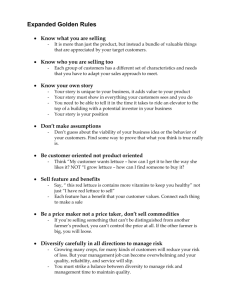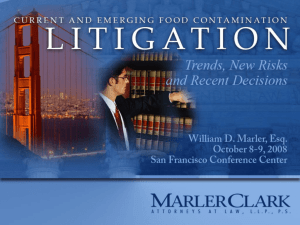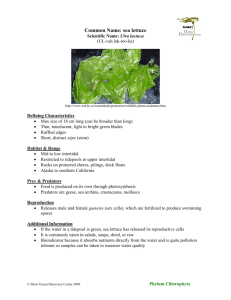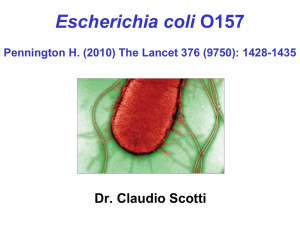E. coli
advertisement
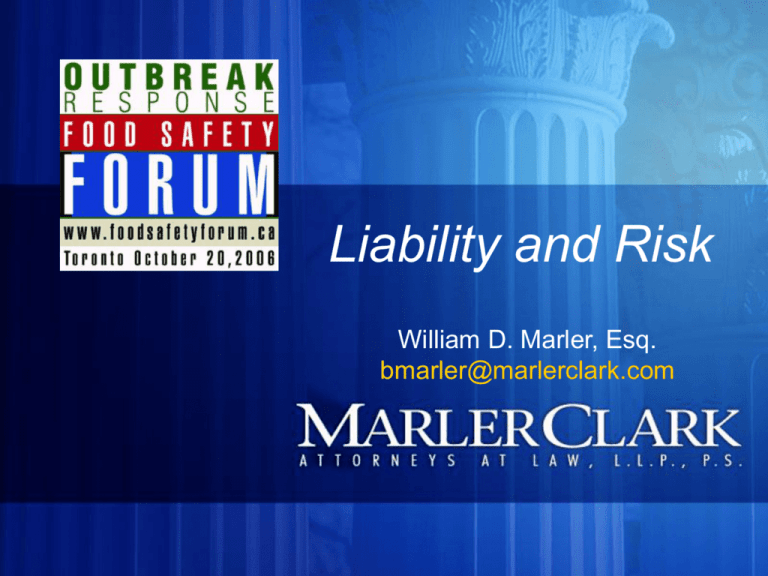
Liability and Risk William D. Marler, Esq. bmarler@marlerclark.com 1 Lettuce and Spinach • 19 E. coli outbreaks since 1995 – 409 reported illnesses – two deaths • Fresh or fresh-cut lettuce or spinach implicated as outbreak vehicle • 8 outbreaks traced back to produce from Salinas, California 2 Recent Lettuce Outbreaks • July 2002 – WA Dance Camp – 50 dance campers sickened, several hospitalized, one with life-long kidney damage – “Pre-washed” lettuce • October 2003 – CA Retirement Center – 13 residents sickened, 2 died – “Pre-washed” spinach Lettuce from all three outbreaks came from California’s Salinas Valley. • September 2003 – CA Restaurant – 40 patrons ill – Salads prepared with bagged, “pre-washed” lettuce 3 Prior FDA Warnings • 1998 – FDA “Guide to Minimize Microbial Food Safety Hazards for Fruits and Vegetables.” – Specifically designed to assist growers and packers in the implementation of safer manufacturing practices. • 2004 – FDA letter to the lettuce and tomato industries – To “make them aware of [FDA’s] concerns regarding continuing outbreaks associated with these two commodities and to encourage the industries to review their practices.” 4 Dole Lettuce E. coli Outbreak – Fall 2005 • September 22-29, 2005 – MN DOH lab receives 10 human E. coli O157:H7 isolates for subtyping – PFGE shows that all 10 share unique 2 restriction enzyme combination • September 28, 2005 – Illness linked epidemiologically to consumption of Dole prepackaged lettuce 5 Dole Lettuce E. coli Outbreak – Fall 2005 • October 3, 2005 – MN Dept. of Ag isolates E. coli O157:H7 in Dole lettuce obtained from households of casepatients • October 5, 2005 – Oregon resident with O157, PFGE match to “outbreak” strain. Reports eating lettuce prior to symptom onset. 6 Dole Lettuce E. coli Outbreak Summary • 23 laboratory-confirmed cases of E. coli O157:H7; 7 epi linked cases • September 16 to September 30 onset • 2 cases of HUS • Cases in MN, OR, and WI • Statistically associated with eating Dole prepackaged lettuce • “Smoking Gun” – found in bag 7 FDA – Adulterated – 2005 • FDA cited to research linking some or all of the outbreaks to sewage exposure, animal waste, and other contaminated water sources. The research further indicated that industry practices, including and field drainage “Inirrigation light of continuing outbreaksmethods, associatedmay withhave fresh and led directly to the of the lettuce with fresh-cut lettuce and contamination other leafy greens, particularly from E. coli O157:H7. California, we are issuing this second letter to reiterate our and to strongly encourage firms in your industry to •concerns FDA considers “adulterated” review their current operations.” any ready to eat crops produced under unsanitary conditions §402(a)(4) of the Food, Drug, and Cosmetic Act 8 CADOHS to Western Growers - 2006 • A reassessment of current manure composting regulations…in light of recent scientific findings. • An assessment of…septic tank systems that may leak/flow into agricultural ditches or creeks bordering fields used to grow ready-to-eat produce. • An assessment of…farm worker access to portable toilets and hand washing facilities. 9 CADOHS to Western Growers – 2006, cont. • An assessment of the locations of fields known to flood frequently. • An assessment of the need for…mandatory GAPs and/or HAACP Plans. 10 Dole and Natural Selections – Fall 2006 • 199 persons infected with outbreak strain of E. coli O157:H7 from 26 states. • 102 (51%) hospitalized • 31 (16%) developed hemolytic-uremic syndrome (HUS) • Three confirmed deaths – Maryland investigating possible fourth 11 Dole and Natural Selections – Fall 2006 • E. coli O157:H7 – Isolated from 13 packages of DOLE spinach – “DNA fingerprints” of all 13 match the outbreak strain – Supplied by patients living in 10 states – Eleven packages with lot codes consistent with a single manufacturing facility on a particular day 12 The Smoking Cow Pie 13 Cross-Border Connection? • E. coli sickens many in Ontario • TORONTO (CP) - More than 30 people in two Ontario cities may have fallen ill from eating lettuce tainted with potentially deadly E. coli, but there's no longer any need for concern, health authorities said Friday. 14 The Legal Standard: Strict Liability • The focus is on the product; not the conduct • They are liable if: • The product was unsafe • The product caused the injury STRICT LIABILITY IS LIABILITY WITHOUT REGARD TO FAULT. 15 Who is a Manufacturer? A “manufacturer” is defined as a “product seller who designs, produces, makes, fabricates, constructs, or remanufactures the relevant product or component part of a product before its sale to a user or consumer….” RCW 7.72.010(2); see also Washburn v. Beatt Equipment Co., 120 Wn.2d 246 (1992) 16 It’s called STRICT Liability for a Reason • The only defense is prevention • Wishful thinking does not help • If they manufacture a product that causes someone to be sick they are going to pay IF they get caught 17 Negligence The legal standard applied to non-manufacturers The reason for excluding nonmanufacturing retailers from strict liability is to distinguish between those who have actual control over the product and those who act as mere conduits in the chain of distribution. See Butello v. S.A. Woods-Yates Am. Mach. Co., 72 Wn. App. 397, 404 (1993). 18 Punitive (or Exemplary) Damages: Punish the defendant for its conduct; Deter others from similar conduct. Historically, such damages were awarded to discourage intentional wrongdoing, wanton and reckless misconduct, and outrageous behavior. 19 Causation – Science “Causation is an essential concept in epidemiology, yet there is no single, clearly articulated definition ….” J Epidemiol Community Health 2001Dec;55(12):905-12; Parascandola M, Weed DL. Confidence Interval (CI) – Range within which 95% of times the true value of the estimated association lies (95% CI) 20 Causation – The Law “A proximate cause of an injury is a cause which, in natural and continuous sequence, produces the injury, and without which the injury would not have [likely] occurred. The concept of proximate causation has given courts and commentators consummate difficulty and has in truth defied precise definition.” Prosser, Torts, pp. 311-313 However, “It really is what is more likely than not. It is 50% and an extra grain of sand.” Marler on the law 21 But, Causation Still Requires Admissible Evidence • Whether a theory or technique can be (and has been) tested • Whether it has been published and subjected to peer review • Whether it has a high potential rate of error • Whether it enjoys general acceptance in the scientific community Daubert v. Merrell Dow Pharm., Inc., 509 U.S. 579 (1993). 22 Will Industry Continue to Learn from Outbreaks? • Good Reasons - Bad idea to poison customers - moral reasons - business reasons - Puts Trial Lawyers out of business - please! 23

